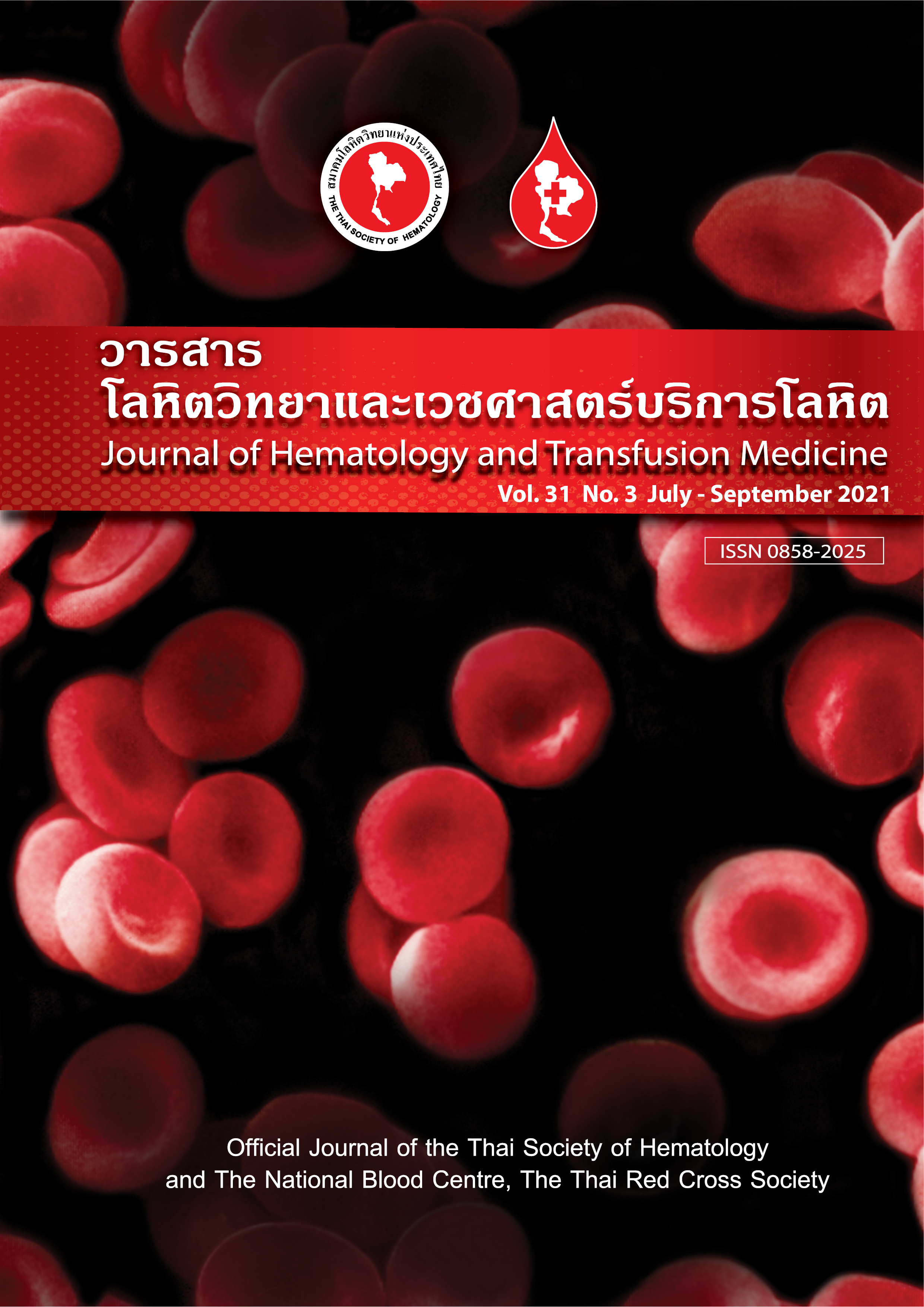แอนติบอดีต่อ High-incidence antigen : anti-Ge2 ที่หายากในผู้ป่วยไทย
Keywords:
Rare blood, Gerbich blood group, High-incidence antigensAbstract
บทคัดย่อ
ผู้ป่วยหญิงไทย อายุ 24 ปี ตั้งครรภ์แรกและแท้งบุตร ผู้ป่วยไม่มีประวัติการรักษาด้วยการให้โลหิต ธนาคารเลือดของโรงพยาบาลแห่งหนึ่งตรวจพบว่า ผู้ป่วยมีหมู่โลหิต O, Rh(D) positive การตรวจกรองแอนติบอดี ให้ผลบวกกับ screening cells O1 และ O2 ที่ indirect antiglobulin test (IAT) แต่ autocontrol ให้ผลลบ การตรวจหาชนิดแอนติบอดีไม่สามารถระบุชนิดของแอนติบอดีได้ จึงส่งตัวอย่างเลือดผู้ป่วยมาตรวจที่ศูนย์ห้องปฏิบัติการอ้างอิง ศูนย์บริการโลหิตแห่งชาติ สภากาชาดไทย ทางศูนย์ห้องปฏิบัติการอ้างอิงได้ทำการทดสอบซ้ำกับ screening cells 3 cells และ panel cells 11 cells พบว่าให้ผล 3+ เท่าๆ กันกับทุกเซลล์ที่ IAT แสดงว่าผู้ป่วยน่าจะมีแอนติบอดีต่อ high-incidence antigen จากการทำการทดสอบเพิ่มเติมโดยวิธี allogeneic adsorption พบว่าไม่มี common alloantibody และจากการทำ enzyme technic ไม่พบแอนติบอดีในระบบ Rh เมื่อทำการตรวจหาแอนติเจนต่อหมู่เลือดที่เป็น high-incidence antigen เช่น k, Ge2 พบว่าผู้ป่วยเป็น Ge:-2 แอนติบอดีของผู้ป่วยจึงน่าจะเป็น anti-Ge2 ได้ทำการตรวจยืนยันโดยใช้ plasma ของผู้ป่วยทดสอบกับเม็ดเลือดแดงที่เป็น Ge:-2 พบว่าให้ผลเป็นลบ แสดงว่าผู้ป่วยรายนี้มีanti-Ge2
Abstract:
A 24-year-old Thai woman was admitted to the hospital with the diagnosis of spontaneous abortion. She had no transfusion history. She was typed as group O, Rh(D) positive. Antibody screening test was positive with two screening cells O1 and O2 at indirect antiglobulin test (IAT). Autocontrol was negative. Antibody identification was unidentified. Then , the blood sample was sent to National Blood Centre, The Thai Red Cross Society for further investigation. On laboratory workup, the reaction with 3 screening cells and 11 cells of panel cells showed uniform 3+ with all cells at IAT. Antibody to high-incidence antigen should be considered. Further investigation with allogeneic adsorption showed no common alloantibody. Antibody identification by enzyme test showed no antibody in Rh system. Antigen typing for high-incidence antigens such as k, Ge2 showed that this patient was k+, Ge:-2. Antibody confirmation by using her plasma tested with Ge:-2 red blood cells showed negative result. Therefore, this antibody specificity was anti-Ge2.
Downloads
References
Daniel G. Human blood groups. 2nd ed. Oxford: Blackwell Scientific Publications; 2002.
Booth PB, McLoughlin K. The Gerbich blood group system, especially in Melanesians. Vox Sang. 1972;22:73–84.
Okubo Y, Yamaguchi H, Seno T, Kikuchi M, Abe S, Ishijima A, et al. The rare red cell phenotype Gerbich negative in Japanese. Transfusion. 1984;24:274–5.
Ravindra P. Singh Antibodies against high frequency Gerbich 2 antigen (anti-Ge2): a real challenge in cross matching lab. Asian J Transfus Sci. 2013;7:88-9.
You La Jeon, Tae Sung Park, Sun Young Cho, Seung Hwan Oh, Myeong Hee Kim, So Young Kang, et al. The first Korean case report of anti-Gerbich. Ann Lab Med. 2012;32:442-4.
Arndt PA, Garratty G, Daniels G, Green CA, Wilkes AM, Hunt P, et al. Late onset neonatal anemia due to maternal anti-Ge: possible association with destruction of erythroid progenitors. Transfus Med. 2005;15:125-32.
Selleng S, Selleng K, Zawadzinski C, Wollert HG, Yürek S,Greinacher A. Management of emergency cardiac surgery in a patient with alloantiGe2. Transfus Med. 2009;19:50-2.
Hildebrandt M, Hell A, Etzel F, Genth R, Salama A. Determination and successful transfusion of anti- Gerbich positive red blood cells in a patient with a strongly reactive anti-Gerbich antibody. Infus Ther Transfus Med. 2000;27:154-6.
Mochizuki T, Newlon T, Ramsey G. In vivo cross-match by chromium-51 urinary excretion from labeled erythrocytes: a case of anti-Gerbich. J Nucl Med. 1990;31:2042-4.
Pearson HA, Richards VL, Wylie BR, Bruce D, Watt JM, Wilkie D, Kronenberg H. Assessment of clinical significance of anti-Ge in an untransfused man. Transfusion. 1991;31:257-9.
John D, Brend J, Teresa Harris, Christopher D. Investigation of a Positive DAT. Technical manual. Bethesda, MA: American Association of Blood Banks; 2011. p. 925-6.



